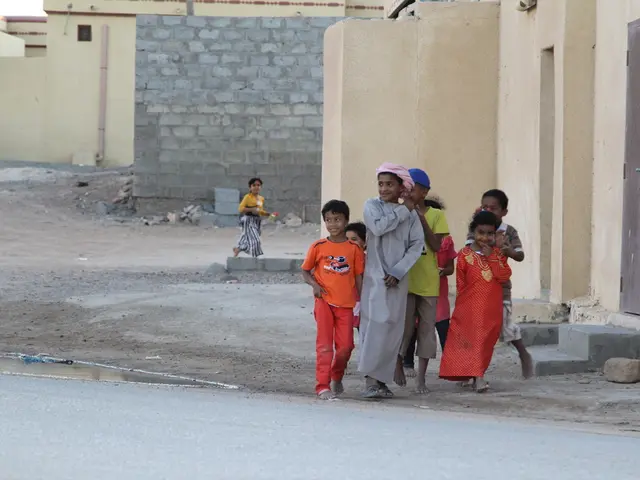Bangkok Fights AIDS Through Health Zoning, Proposes BMA
Bangkok deputy governor outlines AIDS strategies during health zoning workshop
On April 8, 2025, Associate Professor Tavida Kamolvej, acting deputy governor of Bangkok, delivered a speech on potential strategies for addressing HIV in Bangkok's healthcare zones at a workshop focusing on Bangkok's health zoning. The gathering took place in the Kasat Suek 2 Room on the fourth floor of The Twin Towers Hotel in Bangkok's Pathumwan district.
In the address, Tavida reported that the Bangkok Metropolitan Administration (BMA) has engaged in discussions with a network of public and private agencies about the direction for tackling AIDS within the city's healthcare zones. During previous inspections of homeless individuals, she noted that 1,000 condoms were distributed, signifying progress in promoting safe practices.
She acknowledged that collaboration with additional entities like district offices and city law enforcement agencies would be necessary to ensure a comprehensive approach. Tavida emphasized that discourses should encompass a broad spectrum of perspectives, beyond mere numerical assessments, to develop innovative strategies that prioritize safety.
The governor of Bangkok, Tavida stated, regularly emphasizes the need to streamline work processes while reducing administrative burden on civil servants. She expressed a belief that approaches to combating AIDS should be simple and culturally sensitive in order to gain traction with the public.
Tavida suggested expanding the network of collaborating agencies to raise awareness of AIDS and reduce stigma across the community. In reference to the US decision to cut global health aid, she also highlighted the challenges this poses for the BMA's efforts.
Tavida proposed that the BMA might utilize some of its budgetary flexibility to continue the work in the face of reduced funding, from a medical perspective. She also emphasized the crucial role of healthcare zones, which should serve as facilitators, streamlining work and intervening when needed.
Tavida likened hospitals to financial reservoirs and public health centers to area managers responsible for using funds from the National Health Security Office. She expressed hope that the zoning system might be used more extensively for communication and data management.
Parts of the BMA's overall strategy remain to be disclosed. Global trends in HIV prevention and treatment, such as opt-out screening, self-testing, PrEP strategies, and stigma reduction tactics, may serve as potential guiding principles for the BMA's efforts in Bangkok. The Bangkok Metropolitan Administration (BMA) may collaborate with international organizations, engage local communities, and explore innovative solutions to address the challenge posed by reduced global health aid.
- The international community, including organizations, needs to be involved in the BMA's AIDS combat strategies.
- The city's healthcare zones should also focus on health-and-wellness, encompassing chronic-kidney-disease, cancer, respiratory-conditions, digestive-health, eye-health, hearing, and skin-conditions.
- Tapping into the workplace-wellness sector could provide valuable insights and solutions for addressing chronic-diseases and mental-health issues.
- The BMA might partner with the industry to implement workplace-wellness programs to address medical-conditions and autoimmune-disorders.
- Education on the importance of skin-care and therapies-and-treatments could be emphasized in these programs.
- The workforce could also benefit from stress management techniques to improve cardiovascular-health and mental-health.
- Incorporating leadership development courses within these programs would foster a healthy, supportive, and diverse workplace (diversity-and-inclusion).
- Small-business owners in the city could receive financial support through Medicare to focus on employee well-being and healthcare.
- CBD, a popular supplement for health-and-wellness, could be researched for its potential role in managing chronic-conditions and stress.
- Association with financial institutions could help with wealth-management and debt-management, ensuring a stable financial environment for businesses and their employees.
- People with AIDS must always practice safe sex to prevent transmission, which links back to the importance of condom distribution (as mentioned by Tavida).
- The BMA could launch campaigns to address sexual-health and to reduce the stigma associated with the condition.
- Fostering open conversations, especially within local communities, would encourage seeking help and could lead to earlier detection and treatment.
- Innovative solutions could be found through data-and-cloud-computing, helping the BMA manage information more efficiently.
- Collaboration with technology companies could enhance healthcare services with digital tools.
- Sustainable-living advocates should also be involved in these efforts, as a healthier lifestyle could bolster the body's defenses against various health issues.
- Home-and-garden enthusiasts could also contribute by promoting healthy-cooking and baking through community workshops.
- Cooking classes teaching global-cuisines would not only encourage a healthy diet but also foster cross-cultural relationships.
- Food-and-drink establishments could be coached on allergen-awareness strategies, benefitting people with chronic-conditions like digestive-health or skin-conditions.
- Dining experiences could be redesigned to cater to various dietary requirements, promoting wellness and inclusivity.
- Restaurants and cafes could also focus on catering to dietary restrictions based on medical-conditions, emphasizing hearing and eye-health needs.
- Interior-designers could play a part by designing health-friendly spaces that promote relaxation and recovery for patients with chronic-kidney-disease or cardiovascular-health issues.
- Healthcare professionals could collaborate with designers to create soothing environments that aid patient healing and reduce stress.
- Cybersecurity companies should be recruited to protect sensitive patient data, ensuring the confidentiality of AIDS patients during treatment.
- As the issue of AIDS remains a concern in outdoor-living areas, the BMA should collaborate with experts to develop policies addressing health issues related to living conditions.
- There is also a need to promote responsible living in food-and-drink establishments to reduce risks from foodborne illnesses and other related health hazards.
- Tavida's emphasis on reducing administrative burdens indicates that the BMA should leverage technology to streamline communication and processes within the healthcare system.
- Additionally, the BMA should prioritize developing partnerships with businesses and entrepreneurs in baking, beverages, lifestyle, outdoor-living, food-and-drink, dining, and home-and-garden to build a stronger city network addressing various health and lifestyle issues.







